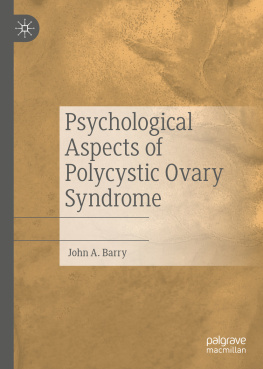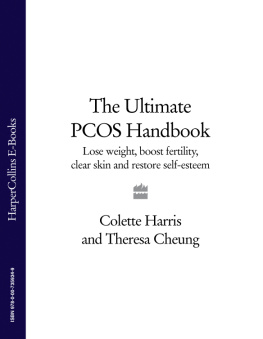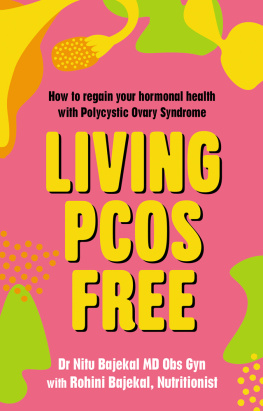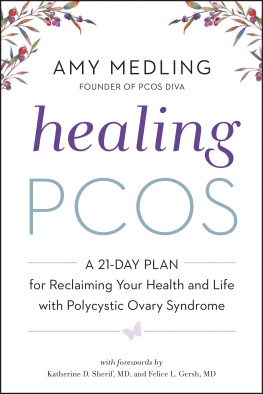John A. Barry - Psychological Aspects of Polycystic Ovary Syndrome
Here you can read online John A. Barry - Psychological Aspects of Polycystic Ovary Syndrome full text of the book (entire story) in english for free. Download pdf and epub, get meaning, cover and reviews about this ebook. year: 2019, publisher: Springer International Publishing, genre: Romance novel. Description of the work, (preface) as well as reviews are available. Best literature library LitArk.com created for fans of good reading and offers a wide selection of genres:
Romance novel
Science fiction
Adventure
Detective
Science
History
Home and family
Prose
Art
Politics
Computer
Non-fiction
Religion
Business
Children
Humor
Choose a favorite category and find really read worthwhile books. Enjoy immersion in the world of imagination, feel the emotions of the characters or learn something new for yourself, make an fascinating discovery.
- Book:Psychological Aspects of Polycystic Ovary Syndrome
- Author:
- Publisher:Springer International Publishing
- Genre:
- Year:2019
- Rating:4 / 5
- Favourites:Add to favourites
- Your mark:
- 80
- 1
- 2
- 3
- 4
- 5
Psychological Aspects of Polycystic Ovary Syndrome: summary, description and annotation
We offer to read an annotation, description, summary or preface (depends on what the author of the book "Psychological Aspects of Polycystic Ovary Syndrome" wrote himself). If you haven't found the necessary information about the book — write in the comments, we will try to find it.
Psychological Aspects of Polycystic Ovary Syndrome — read online for free the complete book (whole text) full work
Below is the text of the book, divided by pages. System saving the place of the last page read, allows you to conveniently read the book "Psychological Aspects of Polycystic Ovary Syndrome" online for free, without having to search again every time where you left off. Put a bookmark, and you can go to the page where you finished reading at any time.
Font size:
Interval:
Bookmark:
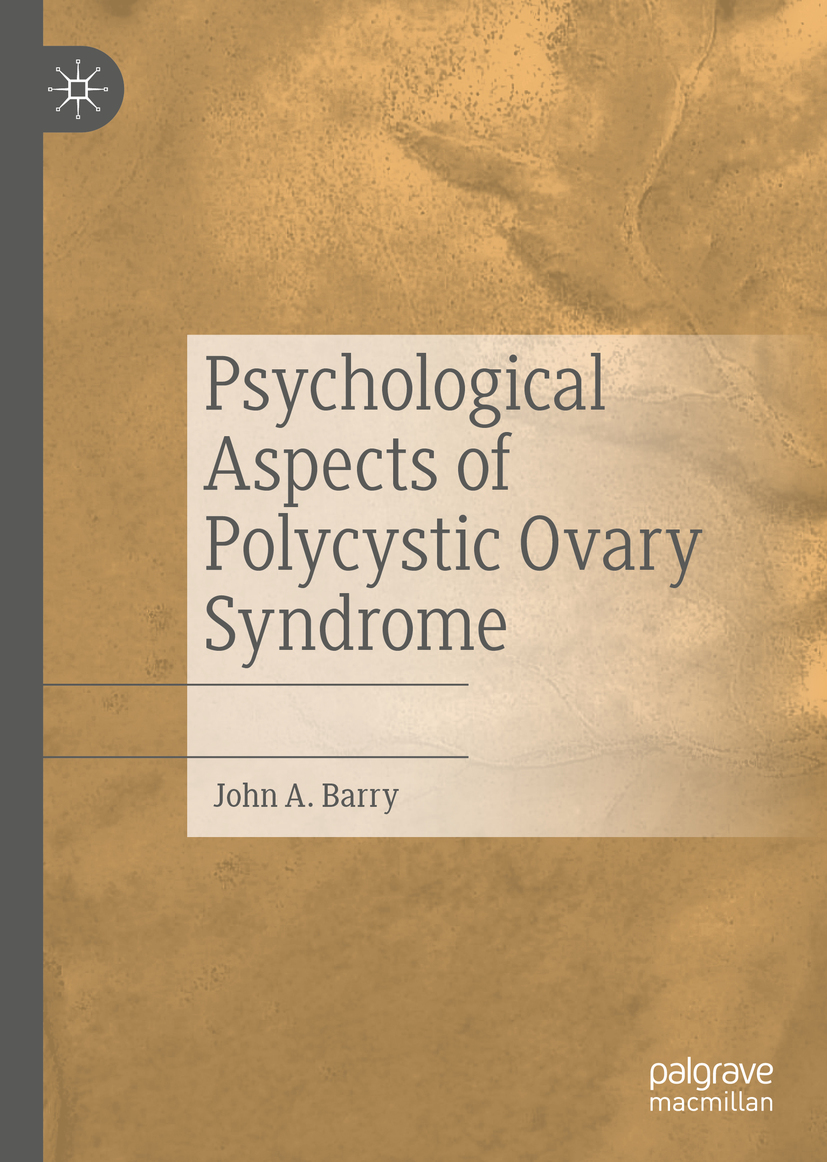
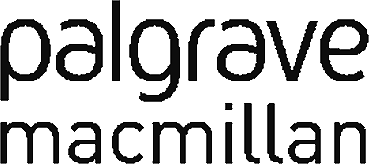
This Palgrave Macmillan imprint is published by the registered company Springer Nature Switzerland AG.
The registered company address is: Gewerbestrasse 11, 6330 Cham, Switzerland
When I completed my PhD on the psychological aspects of PCOS in 2011, I was very eager to introduce my research to my peers in the field of psychology. I had already done a few presentations to my fellow students and lecturers at City University, London, though often the feedback was this is interesting but a bit too medical. I had a much better reception when presenting to gynaecologists and endocrinologists, because I brought to life some of the experiences they had built up from years of helping women with PCOS, and addressed with research evidence some of the intuitions they had developed about their patients.
So in 2011 I was particularly happy to be presenting the material from my PhD thesis to the European Health Psychology Society (EHPS) in Crete. I was confident that my material was up to standard because my thesis was a PhD by publication, that is, it was a compilation of peer-reviewed publications of my research programme, and all of the publications were of respectable quality, and in a couple of cases, very respectable.
This was a big conference spanning five days, and featuring some leading names in health psychology. Although my material was being presented only as a poster rather than as an oral presentation, I was still excited in anticipation of what kinds of reactions I would get, conversations I would have, collaborations that might be generated. I need not have been so hopeful. Lots of psychologists glanced at my poster and walked on by. Very few showed any more than the merest interest. Much more fascinating to them were the health behaviour models that were being presented and discussed in seminars and workshops. I booked a special feedback session with a leading health psychologist from the US, who told me that my work wasnt really health psychology maybe more like behavioural medicine. Shouldnt there be more health belief models in my work? I got the point, but couldnt help thinking that her comments reflected an unhealthy obsession in health psychology with trying to make health belief models work better. I couldnt understand why people werent more interested in testing more tangible bio-psychological models (see Chap.). When the conference was over and it came time for me to leave I was disappointed that I had met only one person who was interested in my research, and this persons interest was based solely on the fact that my material was about womens health.
Fast forward to the annual British Psychological Society conference in England in May 2017. I had spent most of the intervening years working at the University College London Medical School at the Royal Free Hospital London in Hampstead, first as a research co-ordinator of clinical trials, and then, as a research associate. I put a huge number of hours into PCOS projects that were published, in increasingly in esteemed journals, and was now about to present what I thought was my most exciting project yetmy psychological intervention for women with PCOS.
This was a project I had wanted to do as part of my PhD several years previously, and although it had received ethical approval at City University, the project had stalled in the protracted admin process of approval to recruit participants via the UKs main PCOS charity. Not to worrysome years later, I received ethical approval to recruit at the Royal Free Hospital and University College Hospital. With the help of Brazilian psychotherapist Noelia Leite and other colleagues, our project concluded that androgens can be reduced in PCOS just by using a psychological intervention. This was an exciting discovery.
Now I was standing at the BPS conference. Just as in Crete, I had a poster rather than oral presentation, but never mind. The main thing was that I had a chance to reveal my work to my peers, discuss the implications of the project, and perhaps generate some interest in future research. To my growing dismay almost nobody was interested in my project. The only person who showed interest was a psychologist who said that her female-to-male transsexual clients really liked having PCOS because it gave them a natural boost of androgens . Although of course I found this interesting, I knew that the vast majority of women with PCOS would be perplexed and extremely disappointed to know that not only was there little interest in their condition among psychologists, but that the only psychologist interested thought that PCOS is a good thing.
Im writing about these experiences to give you some idea of baseline level of interest in PCOS among psychologists in the UK, a level of interest that I believe is replicated globally. There are some exceptions to this rule, notably research teams in the US, Australia, Greece, Italy, and Germany. Despite the excellence of these groups, when you consider the scale of PCOS (at least 1 in 10 women worldwide) and the fact that we are only scratching the surface of the mental health issues related to PCOS (e.g. there are only a handful of studies on interventions for depression in PCOS), then you start to realise that to call PCOS a hidden epidemic, as Samuel Thatcher did in 2000, is not far from the truth.
I hope that this book provides a solid platform and guidance for the next generation of PCOS researchers, healthcare workers, and students who will take PCOS research forward. The first three chapters describe and discuss the state of our existing knowledge on different aspects of the mental health and psychobiological aspects of PCOS. The subsequent chapters push the boundaries of what we know about the psychological aspects of testosterone , and provide a theoretical framework as roadmap of the causal relationships between biochemicals and psychology in PCOS. Some of this is speculative, to be sure, but it is the business of science to speculate and generate hypotheses that can then be tested.
Font size:
Interval:
Bookmark:
Similar books «Psychological Aspects of Polycystic Ovary Syndrome»
Look at similar books to Psychological Aspects of Polycystic Ovary Syndrome. We have selected literature similar in name and meaning in the hope of providing readers with more options to find new, interesting, not yet read works.
Discussion, reviews of the book Psychological Aspects of Polycystic Ovary Syndrome and just readers' own opinions. Leave your comments, write what you think about the work, its meaning or the main characters. Specify what exactly you liked and what you didn't like, and why you think so.

